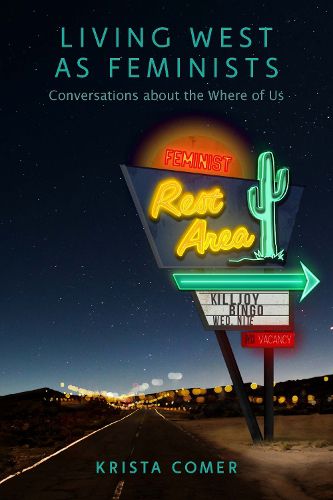Readings Newsletter
Become a Readings Member to make your shopping experience even easier.
Sign in or sign up for free!
You’re not far away from qualifying for FREE standard shipping within Australia
You’ve qualified for FREE standard shipping within Australia
The cart is loading…






In the aftermath of the 2020 U.S. presidential election, Krista Comer invited fifteen colleagues into a conversation about feminism and the U.S. West. From her travels over some thirteen thousand miles to places chosen by participants comes a remarkable series of dialogues focusing on questions about the where of us-the places that we love or belong, or don't belong, and who we are in them.
Living West as Feminists moves from travelogue to interviews to critical meditations. It asks who one's people are, to whom one feels accountable, and how we might make peace with the itinerant, often displaced lives of late-stage capitalist culture. Ultimately, the book understands feminism not as a specific politics or set of theories but as a network of relations. Its coalitional perspective allows for coming together even while distinguishing feminists who write from Black, Indigenous, queer, Chicanx, and materialist perspectives. Feminist rest areas, in which relational securities find footing, can create the most priceless resource in desperate times: well-being and political hope.
$9.00 standard shipping within Australia
FREE standard shipping within Australia for orders over $100.00
Express & International shipping calculated at checkout
In the aftermath of the 2020 U.S. presidential election, Krista Comer invited fifteen colleagues into a conversation about feminism and the U.S. West. From her travels over some thirteen thousand miles to places chosen by participants comes a remarkable series of dialogues focusing on questions about the where of us-the places that we love or belong, or don't belong, and who we are in them.
Living West as Feminists moves from travelogue to interviews to critical meditations. It asks who one's people are, to whom one feels accountable, and how we might make peace with the itinerant, often displaced lives of late-stage capitalist culture. Ultimately, the book understands feminism not as a specific politics or set of theories but as a network of relations. Its coalitional perspective allows for coming together even while distinguishing feminists who write from Black, Indigenous, queer, Chicanx, and materialist perspectives. Feminist rest areas, in which relational securities find footing, can create the most priceless resource in desperate times: well-being and political hope.